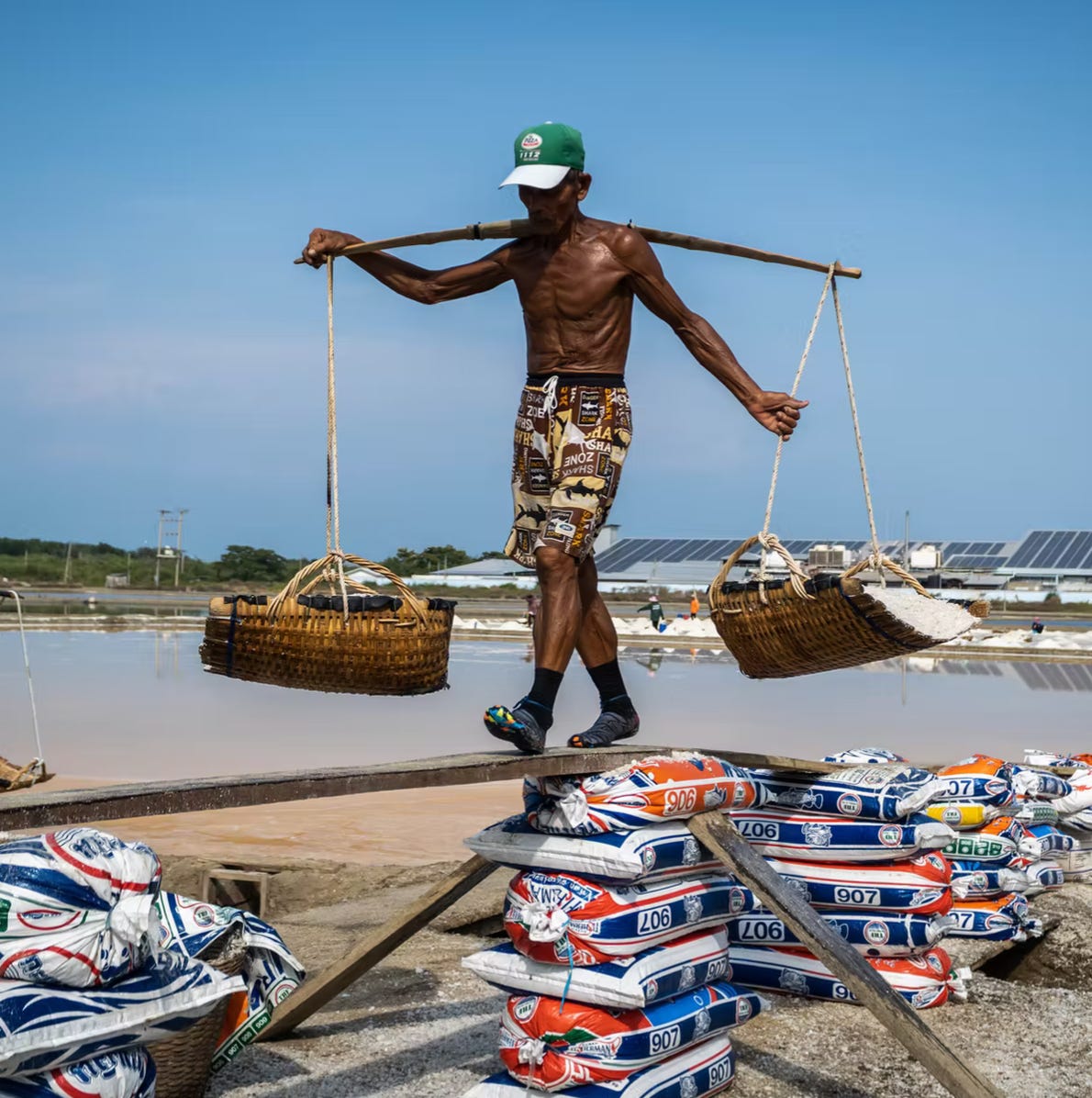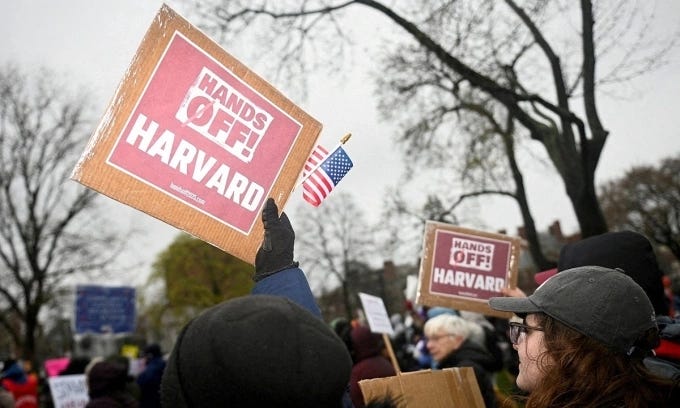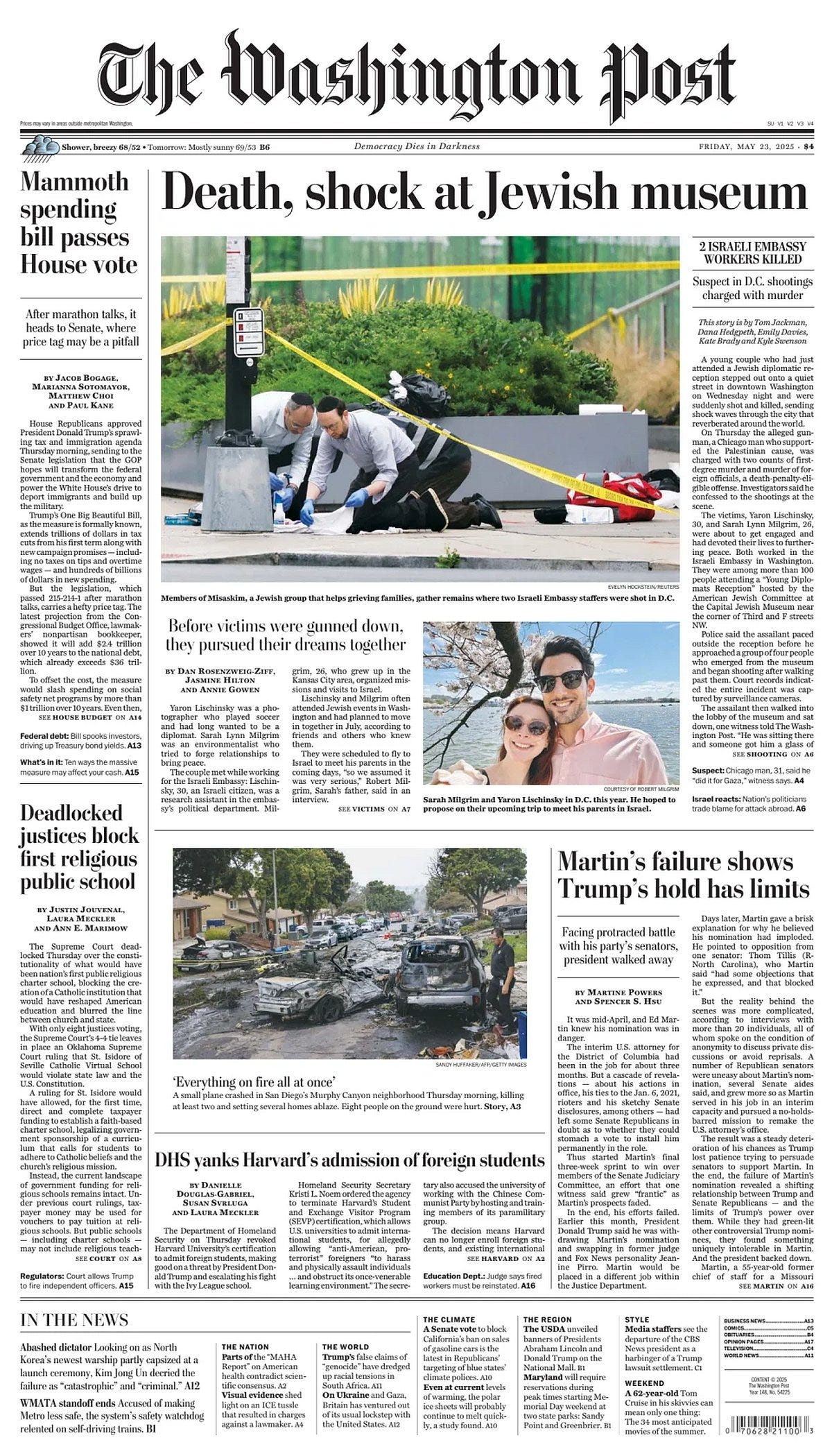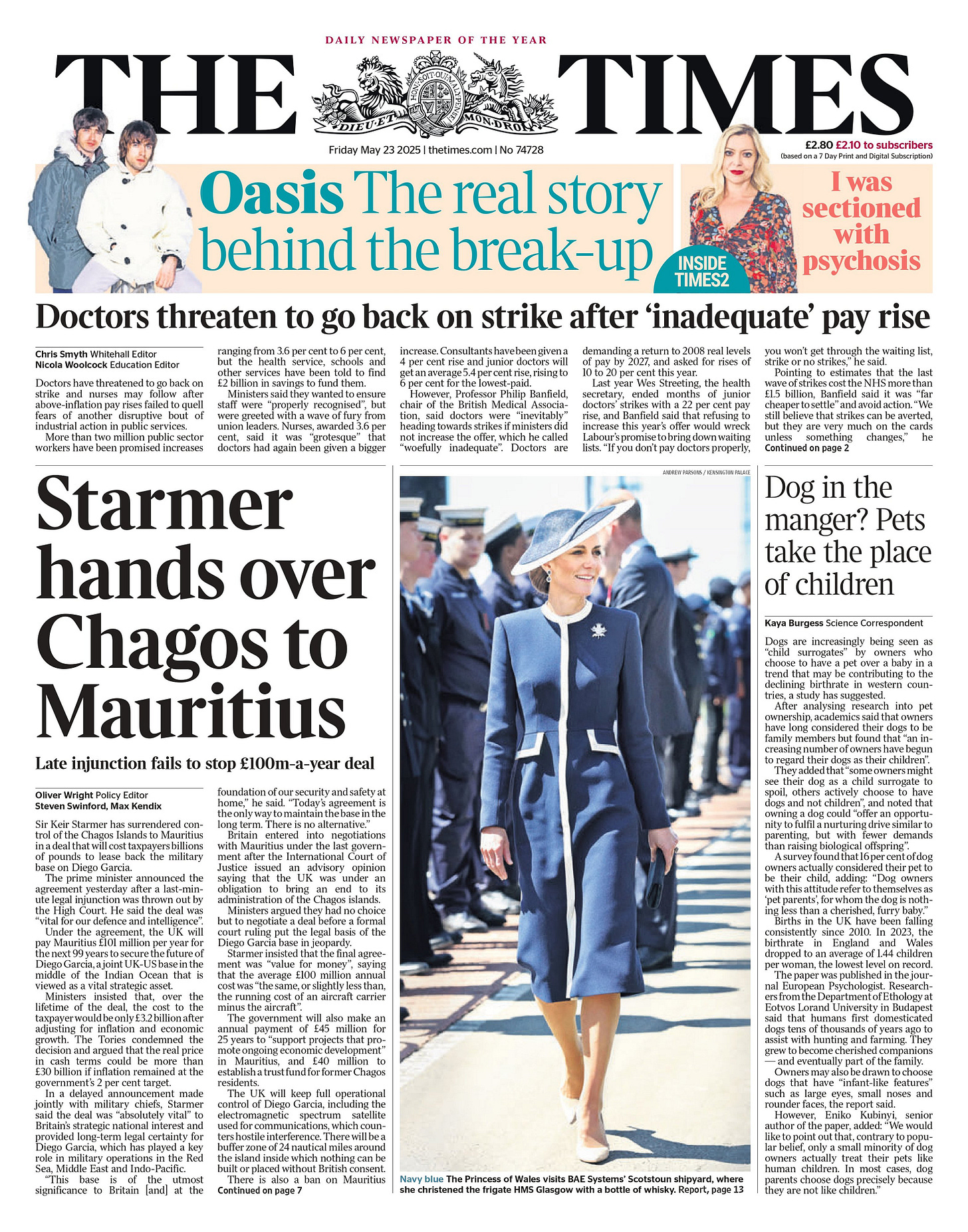White House Escalates Feud with Harvard
Trump administration targets a major funding source, deepening tensions with the elite academic institution.
The Trump administration on Thursday revoked Harvard University’s ability to enroll international students, delivering a sharp punishment to the elite institution for refusing to bow to the administration’s policy demands. “Harvard can no longer enroll foreign students and existing foreign students must transfer or lose their legal status,” the US Department of Homeland Security said in a statement. Homeland Security Secretary Kristi Noem ordered her department to terminate Harvard’s Student and Exchange Visitor Program (SEVP) certification, citing the university’s refusal to turn over the conduct records of foreign students requested by the DHS last month. The decision could impact more than a quarter of Harvard’s heavily international student body, who have been flung into anxiety and confusion by the announcement. Professors warn a mass exodus of foreign students threatens to stifle the academic prowess of the institution even as it battles against the administration for its ideological autonomy. The White House said Thursday that “enrolling foreign students is a privilege, not a right” and accused Harvard leadership of turning “their once-great institution into a hot-bed of anti-American, anti-Semitic, pro-terrorist agitators…They have repeatedly failed to take action to address the widespread problems negatively impacting American students and now they must face the consequences of their actions,” White House spokesperson Abigail Jackson said in a statement to CNN. Harvard and Trump officials have been locked in conflict for months as the administration demands the university make changes to campus programming, policies, hiring and admissions to root out on-campus antisemitism and eliminate what it calls “racist ‘diversity, equity and inclusion’ practices.” The administration has homed in on foreign students and staff it believes participated in contentious campus protests over the Israel-Hamas war. But the university’s leadership argues many of the requests, including an “audit” of the “viewpoint” of its students and staff, go far beyond the role of the federal government and may violate Harvard’s constitutional rights. The university has an enormous foreign student population that could be impacted. It says it has 9,970 people in its international academic population, and data shows 6,793 international students comprise 27.2% of its enrollment in the 2024-25 academic year - CNN
The revocation of Harvard University's right to enrol international students by the Trump administration has shocked students across Asia, with experts warning of a prolonged impact on willingness to choose the U.S. as their destination. A Japanese graduate student at Harvard is anxiously questioning his ability to attend next week's graduation ceremony peacefully, following news on Thursday that raised concerns about his future visa status. The student, who is in his late 20s and passionate about tackling social issues, chose Harvard for its open and liberal school culture and diverse array of courses."We were anticipating that this sort of thing might happen," he told Nikkei Asia regarding Trump's moves, but he said he was surprised by how quickly it escalated. "I had expected things to move more gradually," he added. At Harvard, the number of international students stood at around 5,600, making up over a fifth of the total student population. Chinese students and scholars represented the largest group, with 2,126 individuals, followed by India with 788. The total for South Korea was 434 while Japanese nationals accounted for 260. Yoshimasa Hayashi, Chief Cabinet Secretary of Japan, who also studied at the Harvard Kennedy School, told reporters on Friday that Tokyo is "closely monitoring the situation with great interest." Hayashi said his government will examine the details of the new measure and "take all necessary steps, including engaging with the U.S. side to minimize any potential impact on Japanese students." Akshay Chaturvedi, CEO of Leverage Edu, a study abroad consultancy in New Delhi, India, said, "This move is definitely going to rattle students contemplating studying in the U.S., and consequently impact the country's position as a talent magnet - Nikkei Asia
Russian military intelligence (GRU) has targeted thousands of surveillance cameras across Romania and other NATO countries bordering Ukraine in an attempt to monitor the flow of military and humanitarian aid to Kyiv, according to a recent investigation involving the United States and several European nations. The sweeping cyber-espionage campaign, attributed to the notorious GRU unit 26165, began after Russia launched its full-scale invasion of Ukraine in February 2022. Also known as APT28 or Fancy Bear, GRU unit 26165 is a cyber group responsible for high-profile espionage campaigns against Western governments, defense, and logistics sectors. Investigators said they found that out of approximately 10,000 compromised IP addresses, nearly 1,000 belonged to surveillance cameras in Romania -- making it the second most-affected country after Ukraine itself. Other targeted nations included Poland, Hungary, and Slovakia. The Russian hackers used sophisticated spear=phishing tactics -- sending personalized emails designed to trick users into revealing login credentials on counterfeit websites, investigators said. In some cases, they distributed malware hidden in pornographic material. Once access was gained, attackers could collect sensitive metadata from the cameras, including their location, model, software version, and user information. This access allowed Russian operatives to monitor strategic sites in real time, such as border crossings, military installations, railway stations, and ports -- especially those involved in transporting aid to Ukraine. According to the investigation, the goal was to gather intelligence on the routes and timing of Western support shipments that were flowing over the border and into Ukraine as it fought to repel invading Russian troops. Romania, with its 650-kilometer border with Ukraine, is a crucial transit country for both refugees and aid. Key border points like Siret, Sighetu Marmației, and Galați, as well as Danube ports, have seen intense activity since the war began over three years ago. While the exact routes of military aid remain classified, the exposure of surveillance infrastructure poses serious security risks - RFE/RL
More than 50 Palestinians were killed or remain missing after an Israeli air strike on a residential building in northern Gaza. Gaza’s Health Ministry says 29 children and elderly people who died in recent days in Gaza have been registered as “starvation-related deaths”, and thousands more are at risk of starving. Tommaso Della Longa of the International Federation of the Red Cross says the situation is “simply a nightmare” for people in Gaza. “The news of aid entering the Strip is good news, but it is less than a drop in the ocean,” he said. Longa said even if some aid trucks recently entered the enclave, it did not mean aid was delivered to people. “Until now, people did not get anything, and we need to have a humanitarian operation that scales [with people’s needs]. “If before the conflict started, we needed 500 to 600 trucks a day in Gaza, that means that number is now doubled as the needs are immense.” - Al Jazeera
Stock markets have slumped on both sides of the Atlantic after Donald Trump announced plans to impose a massive 50pc tariff on EU exports to the US. US stock markets opened down this afternoon as investors panicked at the prospect of an escalating US/EU trade war. Mr Trump also threatened tariffs against Apple’s made-in-India iPhones. In a Truth Social post, Mr Trump berated the EU as “very difficult to deal with”, and said US negotiations with Brussels to avoid a transatlantic trade war were “going nowhere”, as he threatened a 50pc tariff starting on June 1. The president’s unexpected escalation would appear to cover the entire $600bn (£447bn) flow of goods exports from the EU to America. EU member states have signed off on a €21bn (£17.6bn) package of retaliatory tariffs of up to 50pc on certain US products, measures which it could now activate if Mr Trump follows through on his threats. Mr Trump seems to have lost patience with Brussels, after reports in recent days suggesting Washington was unhappy with the offer that European negotiators had tabled. The two sides have been negotiating a climbdown from Mr Trump’s ‘Liberation Day’ tariff salvo of April 2. This added a 20pc EU-specific tariff to his “baseline” 10pc tariff, but was later paused for 90 days - CNBC
Trump has also threatened to hit Apple’s iPhones with fresh tariffs if the technology giant fails to shift manufacturing to the US, a move that could increase the price of the smartphones by hundreds of dollars. The Republican said he would add import duties of 25pc to any iPhones built overseas. “I have long ago informed Tim Cook of Apple that I expect their iPhone’s that will be sold in the United States of America will be manufactured and built in the United States,” Mr Trump said, “not India, or anyplace else…If that is not the case, a tariff of at least 25pc must be paid by Apple to the US,” he added in a post on Truth Social.
An exchange of prisoners between Russia and Ukraine was underway Friday, a senior Ukrainian official said, in one of the few signs of progress in international efforts to halt the fighting. The swap was not yet finished, according to the official, who spoke on condition of anonymity because he was not authorized to speak publicly. Moscow did not immediately confirm the exchange was underway. Ukraine and Russia agreed to the exchange of 1,000 prisoners from each side a week ago in Turkey in their first direct peace talks since the early weeks of Moscow’s 2022 invasion of its neighbor. That meeting lasted only two hours and brought no breakthrough in international diplomatic efforts to stop the fighting. The Ukrainian comment Friday came after U.S. President Donald Trump said Russia and Ukraine had carried out a large exchange of prisoners - AP
Russia carried out a targeted strike on the international port in the southern Ukrainian city of Odesa today. Images published by Ukrainian media showed fires on the container area, which was being re-established after a long pause. One person was killed and eight others injured, Odesa Oblast Governor Oleh Kiper said.
Russia and Ukraine have each handed over 390 soldiers and civilians in the biggest prisoner exchange since the start of the full-scale Russian invasion in 2022.
They both returned 270 servicemen and 120 civilians on the Ukrainian border with Belarus, as part of the only deal agreed in direct talks in Istanbul a week ago.
Both sides had agreed to an exchange of 1,000 prisoners and confirmed there would be further swaps in the coming days. Although there have been dozens of smaller-scale exchanges, no other handover has involved as many civilians - BBC
At Bangkok Photo Exhibit, Stark Realities of Worker Exploitation Come Into Focus
At a photo exhibition opening this evening in Bangkok at the Foreign Correspondents’ Club of Thailand, French photojournalist Nathalie Jamois unveiled a powerful and unsettling portrayal of labor conditions in Southeast Asia. The exhibit, titled "Democratic Jungle: The Invisible Struggles of the Workers Who Power Our World," sheds light on the daily hardships faced by food delivery workers and migrant laborers, especially in Thailand.
The images and testimonies reveal a system rife with exploitation, where precarious work, poverty wages, and lack of protections are the norm. “You are working today to eat tonight… there is no security, no safety,” said Friso Poldervaart, co-founder of the Bangkok Community Help Foundation. He noted that many elderly gig workers survive on as little as 20 baht a day—about 60 U.S. cents.
Poldervaart also recalled the grim reality during the COVID-19 pandemic, when workers were confined to labor camps run by major construction firms. “When pressure was applied to vaccinate them, only a single jab was provided,” he said, highlighting the systemic neglect.
The exhibit also touches on growing tensions around public space in Bangkok, where some well-off residents are lobbying the city to remove sidewalk vendors. Advocates argue that such efforts threaten a vital part of the informal economy and the livelihoods of thousands.
Phil Robertson, a long-time human rights activist, pointed out that Singapore, often praised for its efficiency, performed “extraordinarily badly” in its treatment of migrant workers during the pandemic. “Workers living in dormitories were neglected for a long time,” he said. (More on Singapore’s pandemic response and its impact on migrant labor can be found in my book Digital Pandemic.)
Jamois’ exhibit is a stark reminder of the human cost behind the convenience of modern urban life—and the urgent need for systemic reform. You can view more of the work of Jamois here

“Sometimes a smile can hide pain, shame, struggle and distress…I can not tolerate anymore the injustice people face” - Nathalie Jamois, French photojournalist based in Bangkok, speaking today at the opening of her photo exhibit on the invisible struggle of workers at the Foreign Correspondents’ Club of Thailand





